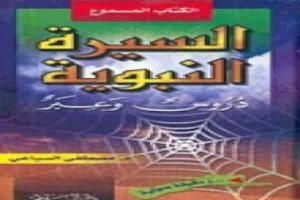Newly released
This book is new and will be uploaded as soon as it becomes available to us and if we secure the necessary publishing rights.

السيرة النبوية - دروس وعبر
(0)
Author:
Mustafa Al-SebaeiNumber Of Reads:
307
Language:
Arabic
Category:
ReligionsSection:
Pages:
176
Quality:
good
Views:
2542
Quate
Review
Save
Share
Book Description
Mustafa Al-Sebaei
Mustafa bin Hosni al-Sibai is the founder of the Muslim Brotherhood movement in Syria. He was born in the city of Homs in Syria in 1915. He grew up in an ancient scientific family known for science and scholars for hundreds of years. His father and grandfathers took up the rhetoric in the Great Mosque of Homs, generation after generation. He was influenced by his father, Sheikh Hosni. Al-Sibai, who had well-known stances against the French colonizer, went in 1933 to Egypt to study at Al-Azhar, and there in 1941 he participated in the demonstrations against the British occupation. Three months later, he was transferred to Sarafand detention center in Palestine, where he remained for four months, then he was released on bail. During his studies in Egypt, al-Sibai met the founder of the Muslim Brotherhood, Hassan al-Banna, and the relationship between them remained after his return to Syria, where scholars, preachers and men of Islamic societies met in the Syrian governorates and decided to unite their ranks and work as one group, and thus the Muslim Brotherhood was established from them for the whole of the Syrian country. This meeting was attended by Said Ramadan from Egypt, and that was in 1942, then three years later in 1945, Mustafa al-Sibai was chosen to be the first general observer of the Muslim Brotherhood in Syria. In Homs against French policy, he was arrested again by the French as well because of the sermons he was giving against French policy and the French occupation. He also participated in the Palestine War in 1948, where he led the Syrian battalion in 1947. He established the newspaper (Al-Manar) until it was suspended by Hosni al-Zaim after the military coup in 1949. In 1955, he founded, with others, the weekly (Al-Shehab) magazine, which continued to be published until the establishment of the union with Egypt in 1958 in the same year, i.e. 1955. It stopped in Egypt and continued to be published in Damascus until 1958, when it moved to its owner Saeed Ramadan in Geneva, Switzerland. Al-Sibai issued in its place the monthly “Civilization of Islam” magazine. Al-Sibai remained based on this magazine until he died, where it was issued by Muhammad Adib Al-Saleh in Damascus, and Al-Sibai was also elected as a deputy On behalf of Damascus in the Constituent Assembly in 1949, then he was elected Vice-President of the Council, and a member of the Constitution Committee consisting of 9 members. In 1950, he was appointed as a professor at the Faculty of Law at the Syrian University.
Book Currently Unavailable
This book is currently unavailable for publication. We obtained it under a Creative Commons license, but the author or publisher has not granted permission to publish it.
Rate Now
5 Stars
4 Stars
3 Stars
2 Stars
1 Stars
Quotes
Top Rated
Latest
Quate
Be the first to leave a quote and earn 10 points
instead of 3
Comments
Be the first to leave a comment and earn 5 points
instead of 3